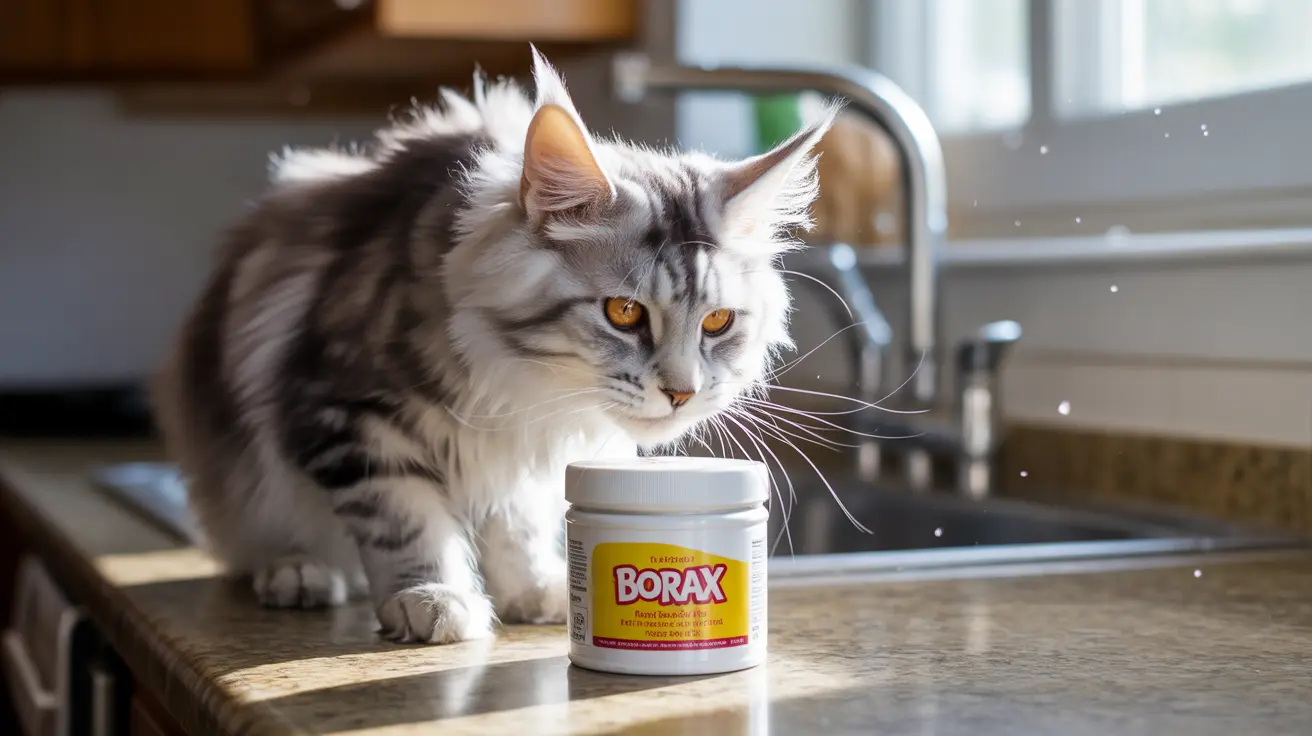Understanding Borax and Its Dangers to Cats
Borax, also known as sodium borate or boric acid, is a naturally occurring mineral compound commonly used in household cleaning products, laundry boosters, and pest control solutions. Despite its natural origins, borax can be highly toxic to cats, with as little as 5 grams potentially proving fatal.
How Cats Can Be Exposed to Borax
Direct Contact and Ingestion
Cats can be exposed to borax through several routes:
- Licking paws after walking on cleaned surfaces
- Grooming fur that has come in contact with borax powder
- Direct ingestion of borax-containing products
- Breathing in borax dust during cleaning
Secondary Exposure Risks
Even if you're careful with borax application, cats can encounter it through:
- Residue left on floors and surfaces
- Dust settling on furniture and cat beds
- Transfer from human hands to cat fur during petting
Signs of Borax Poisoning in Cats
Watch for these warning signs of borax exposure:
- Excessive drooling or foaming at the mouth
- Vomiting and diarrhea
- Lethargy and weakness
- Tremors or uncoordinated movement
- Difficulty breathing
- Skin irritation or redness
Emergency Response to Borax Exposure
If you suspect your cat has been exposed to borax:
- Remove your cat from the area immediately
- Don't induce vomiting unless directed by a veterinarian
- Contact your vet or pet poison control center right away
- If possible, bring the borax product packaging to the vet
Safe Alternatives to Borax for Cat Households
Instead of borax, consider these pet-safe cleaning alternatives:
- White vinegar and water solutions
- Enzyme-based cleaners
- Pet-safe commercial cleaning products
- Steam cleaning for carpets and floors
Prevention and Home Safety
Protect your cat by implementing these safety measures:
- Store all cleaning products in secure, closed cabinets
- Use pet-safe alternatives for cleaning and pest control
- Keep cats out of rooms during cleaning
- Ensure thorough ventilation when cleaning
- Clean up any spills immediately
Frequently Asked Questions
Is borax toxic to cats and what are the symptoms of borax poisoning?
Yes, borax is highly toxic to cats. Symptoms include excessive drooling, vomiting, diarrhea, weakness, tremors, and difficulty breathing. In severe cases, borax poisoning can lead to kidney failure and death.
What should I do if my cat ingests or comes into contact with borax?
Contact your veterinarian immediately. Don't induce vomiting without professional guidance. If there's skin contact, rinse the affected area thoroughly with clean water.
How much borax is dangerous or potentially fatal to a cat?
As little as 5 grams of borax can be lethal to cats. For perspective, this is approximately one teaspoon of borax powder.
Can inhaling borax dust harm my cat's respiratory system?
Yes, inhaling borax dust can irritate your cat's respiratory system, causing coughing, difficulty breathing, and potential lung damage.
What are safe cleaning alternatives to borax for households with cats?
Safe alternatives include vinegar-water solutions, enzyme cleaners, commercial pet-safe products, and steam cleaning. Always check product labels for pet safety information.
Conclusion
Given the serious risks borax poses to cats, it's best to completely avoid using it in homes with feline companions. The potential dangers far outweigh any cleaning benefits, especially when there are many safe and effective alternatives available. Keep your cat safe by choosing pet-friendly cleaning products and maintaining proper storage of all household chemicals.






